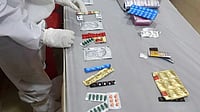The commerce ministry's investigation arm DGTR has "suo-motu" initiated probes against alleged dumping of three products, including unframed glass mirrors and fasteners, by Chinese companies as the authority seeks to guard MSME units against cheap imports from the neighbouring country.
Usually, anti-dumping investigations are initiated based on an application filed by domestic producers, but since the fragmented industries did not have the know-how of the procedures involved in the trade remedy probe, the Directorate General of Trade Remedies (DGTR) has undertaken the exercise to investigate the matter on its own initiative.
According to three separate notifications, the DGTR said that it is probing alleged dumping of telescopic channel drawer, unframed glass mirror and fasteners.
The move is aimed at granting much-needed protection to the MSME (micro, small and medium enterprises) producers against dumped goods from China.
"This is a giant leap forward from DGTR's first suo-motu investigation in 2000 on dry batteries from China wherein the duties were imposed for five years. This is also the first occasion where India's anti-dumping watchdog has initiated three suo-motu investigations at one go against China," a senior government official said.
The directorate had received information that Indian producers of these three products were facing stiff competition from unfairly priced Chinese imports.
According to one of the notifications, a representation was received from Highhope Furniture Fittings Manufacturers Associates Pvt Ltd consisting of 25 manufacturers of telescopic channel drawer stating that there has been a steep decline in Indian production due to a significant increase in dumped imports from China.
It has been estimated that the import value is Rs 356 crore.
On unframed glass mirror, representation was received from All India Mirror Manufacturers Association.
The maximum producers of unframed glass mirrors are medium, small and micro enterprises. Some have already shut down their production as they were unable to survive the competition faced from the dumped imports from Chinese producers/exporters.
In 2022-2023, the demand for the product has been estimated around 1,10,904 metric tonnes in which the imports from China were 80,178 metric tonnes almost catering to 72 per cent of Indian demand with the import value of Rs 183 crore.
Similarly, Apt Tools and Machinery along with Northern Screw Association filed a representation before the DGTR requesting anti-dumping duty on the imports of nuts, bolts, screws from China.
The imports of these nuts and bolts were Rs 137 crore during the last financial year. The producers of the product are SME which is estimated to be around 179 with an investment of more than Rs 1,200 crore catering to an employment of more than 15,000 people.
The imports from China in the last financial year for this product has been around 16,168 metric tonnes.
In 2022-23, India had imported close to USD 100 billion worth of merchandise from China. India's merchandise trade deficit with China stood at USD 83 billion in that fiscal.
To help fragmented industries avail benefits of trade remedies like antidumping and countervailing duties, earlier the DGTR had simplified procedural requirements to facilitate their participation in seeking protection against unfair trade practices of imports.
DGTR had issued trade notices allowing for a sampled analysis of the condition of these industries.
This has made remedies against unfairly priced imports more accessible to domestic producers.
If it is established that the dumping of these products has caused material injury to domestic players, DGTR would recommend the imposition of anti-dumping duty on these imports.
The finance ministry takes the final decision to impose duties.
Anti-dumping probes are conducted by countries to determine whether domestic industries have been hurt because of a surge in cheap imports.
As a countermeasure, they impose these duties under the multilateral regime of Geneva-based World Trade Organization (WTO). The duty is aimed at ensuring fair trading practices and creating a level-playing field for domestic producers vis-a-vis foreign producers and exporters.
India has already imposed anti-dumping duty on several products to tackle cheap imports from various countries, including China.































